Joshua, Book Of
 From Nwe
From Nwe | Books of the |
The Book of Joshua (Hebrew: Sefer Y'hoshua—ספר יהושע) is the sixth book of Bible. It tells the story of Joshua and the Israelites as they march into Canaan, conquer its inhabitants, and prepare to establish themselves as a nation. It is most famous for its dramatic description of the Battle of Jericho.
In Jewish tradition, the Book of Joshua is the first of the books of the "Prophets," although in terms of its literary content—like the Books of Samuel and Kings—it is not a book of prophecy but a history. Some modern scholars theorize that a precursor to Joshua had once been a sixth book of the Yahwistic epic, or "J Source" following the five books of the Pentateuch, but was later incorporated into the historical books edited by the Deuteronomist in the late seventh century B.C.E.
The Book of Joshua describes the Israelites under Joshua as decisively winning every battle they fought with the Canaanites except on rare occasions when a sin had caused God to withdraw his support. Joshua's divinely-commanded tactics allowed the taking of no prisoners, and he is described as slaughtering the entire populations of the cities he conquered, including women and children. This has caused considerable debate both among historians, who doubt the veracity of the book's account of the conquest of Canaan, and theologians, who question whether a God of goodness could truly have ordered such behavior as the Book of Joshua describes.
Contents and structure
The book of Joshua contains a history of the Israelites from the death of Moses through the death of Joshua.
The book essentially consists of three parts:
- The victorious history of the conquest of the land (1-12).
- The allotment of the land to the different tribes, the taking of lands still unconquered, the provision for the Levites and the dismissal of the eastern tribes to their homes (13-22).
- The farewell addresses of Joshua, with an account of his death (23, 24).
Conquest
- Rahab (2). Joshua sends out two spies from Shittim to explore the city of Jericho. They are saved from falling into the hands of the king by the shrewd tactics of Rahab, a harlot, in return for promising not to attack her when they later invade.
- The Crossing of the Jordan (1, and 3-4). Having re-iterated the duty to follow the commandments given through Moses, Joshua orders the Israelites to set forth. When they reach the Jordan River carrying the sacred Ark of the Covenant, the river miraculously stops flowing. The priests carrying it halt, allowing the rest of the Israelites to cross as well. In commemoration of the event, Joshua orders two monuments to be erected: one in the river-bed itself; the other on the western bank, at Gilgal (which does not yet have its name), where the Israelites encamp.
- The Circumcision of the Israelites (5:1-12). The Israelites are circumcised at Gibeath-Haaraloth. This is explained as owing the the fact that those males born during the previous 40-year period in the wilderness had not been circumcised.
- The Captain of the Lord's host (5:13-15). Nearing Jericho, Joshua meets a mysterious man standing with his sword drawn and identifying himself as the "captain of the host of the Lord" arrives. Joshua prostrates himself before this apparently angelic being and asks what message he brings. The man tells Joshua to remove his sandals because the land he stands upon is holy.
- The Battle of Jericho (6)—Placing Jericho under siege, the Israelites employ a divinely-commanded strategy to circle the city quietly once a day for six days, and on the seventh to make seven circuits, each time loudly blowing horns and shouting. On the final circuit, the walls cave in, and the inhabitants, except Rahab and her family, are slaughtered. By God's command, even women and children are not spared. A curse is pronounced against rebuilding the city.
- The First Battle of Ai (7)—The city of Ai, near Bethel, is surveyed and pronounced weak. Joshua sends only a small group to attack them but they are defeated, causing Joshua and the people to the verge of despair. But God announces that the people have sinned, as someone has stolen some of the spoils from Jericho which were meant to be devoted to the sacred Tabernacle. The sinner is discovered by casting lots, finally detecting the culprit as Achan. He admits having taken a costly Babylonian garment, as well as silver and gold, and his confession is verified by the finding of the treasure buried in his tent. Achan is taken into the valley of Achor, where he and his entire family are stoned and burned to death, successfully appeasing God.
- The Second Battle of Ai (8:1-29)—Some 30,000 Israelites set an ambush of Ai overnight, after which another Israelite force attacks in the morning and then feigns retreat, drawing the forces of Ai and Bethel away from the city. The larger force then captures Ai and burns it, "leaving neither survivors nor fugitives," except for Ai's king, who is captured and hung on a tree (possibly still alive); and then his dead body is thrown into a pit and covered with a heap of stones.
- The Ritual of Ebal and Gerizim (8:30-35)—Joshua erects an altar on Mount Ebal and makes offerings upon it, carving the words of the Law of Moses onto stones. The people are arranged into two sections, with one facing Ebal and the other facing Gerizim. They each read the blessings and curses specified in Deuteronomy as appropriate.[1]
- The Hivite Treaty (9) - The Hivites of Gibeon trick the Israelites into thinking them distant foreigners, as opposed to natives of Canaan whom God commanded the Israelites to drive out or destroy. They thus gain a non-aggression treaty from the Israelites, agreeing to become Israel's "servants." They would henceforth be treated as virtual slaves, they would be spared from the order to slaughter all the residents of the land, and the Israelites would also offer them military protection.
- The five kings of the Amorites (10)—Adonizedek, the Jebusite King of Jerusalem, brings about an alliance of the "five kings of the Amorites" (including himself and the kings of Hebron, Jarmuth, Lachish, and Eglon). They besiege the Hivites in Gibeon, whom they perceive as traitors. The Hivites implore Joshua for help, and so he launches a surprise night attack, causing the Amorites to panic and flee as far as Beth-horon. The author quotes from the Book of Jasher, which states that the sun stood still at Gibeon, and the moon in the valley of Ajalon, in order that Joshua could complete the battle. The five kings hide in a cave, but are discovered and trapped there until their army has been completely obliterated, at which point they are killed and hung from trees until nightfall. Several cities (though apparently not Jerusalem) are captured, and the narrator concludes with the following tribute to Joshua and his God:
-
- He totally destroyed all who breathed, just as the Lord, the God of Israel, had commanded. Joshua subdued them from Kadesh Barnea to Gaza and from the whole region of Goshen to Gibeon. All these kings and their lands Joshua conquered in one campaign, because the Lord, the God of Israel, fought for Israel.
- The battle against Hazor (11:1-20, 23)—Jabin, King of Hazor, his army, and those of his vassals, rendezvous at Merom. Joshua, however, executes a swift attack and is able to defeat them. Pursuing them to a great distance, he hamstrings their horses, burns their chariots, captures Hazor, slaughters its inhabitants, and burns it to the ground. The sons of Anak are driven away from the mountains and Hebron. Lesser royal residences are also captured and their inhabitants slaughtered. The narrator declares total victory:
-
- So Joshua took this entire land: the hill country, all the Negev, the whole region of Goshen, the western foothills, the Arabah and the mountains of Israel with their foothills, 17 from Mount Halak, which rises toward Seir, to Baal Gad in the Valley of Lebanon below Mount Hermon. He captured all their kings and struck them down, putting them to death. 18 Joshua waged war against all these kings for a long time. 19 Except for the Hivites living in Gibeon, not one city made a treaty of peace with the Israelites, who took them all in battle. 20 For it was the Lord himself who hardened their hearts to wage war against Israel, so that he might destroy them totally, exterminating them without mercy, as the Lord had commanded Moses.[2]
Division of the Land
This section in someways offers a contradictory view to the previous claim of near complete victory. First a description is given of the domains east of the Jordan which were conquered and given to Reuben, Gad, and half of Manasseh. The Levites are not to receive a particular given territory, but are assigned to cities within the various territories, where they will serve as local priests and religious authorities. The territory west of the Jordan is then handed out by lot.
Judah gains the first lot, although they fail to drive out the Canaanites living in Jerusalem. Then the house of Joseph—consisting of Emphraim and Manasseh, gets its territory. Ephraim fails to drive out the Canaanites of Gezer. (It is pointed out that the daughters of Zelophehad, part of the tribe of Manasseh, are also given territory of their own.) The house of Joseph is also given the hill country and is told that they must drive out the Canaanites living there despite the presence of iron chariots.
The Israelites then assemble at Shiloh, where the Tabernacle is set up and Joshua sends out a survey team. When the survey is complete, the remaining land is divided among the rest of the tribes. Finally, the tribes whose lands are east of the Jordan are allowed to go to their lands.
Other notable events in this section include:
- The Joshua King List (12:7-24)—A list of 31 cities which were conquered and had kings.
- The tribal boundaries.—A detailed description of the boundaries of Judah (15:1-12) and of Benjamin (18:11-20) is quite distinct from the list of their cities. The boundaries of Ephraim (16:4-9) and (half of) Manasseh (17:7-11) are unusual in that they also include enclaves in some of the territory of the surrounding tribes. Descriptions of the boundaries of the other tribes are also given: Reuben (13:15-16, 20, 23a), Gad (13:24-27), Machir (half of Manasseh) (13:29-31), Zebulon (10-14), Issachar (22a), Asher (24, and 26b-29a), and Naphtali (19:32-34). Levi receives only cities, and while cities are listed for Dan and Simeon, the boundaries for these tribes are unclear. Simeon lies within Judah.
- Cities lists by tribe—The lists for Judah (15:20-62) and Benjamin (18:21-28) are extensive, leading many to suspect it was derived from a later administrative document. The lists for the other territorial tribes—Reuben (13:16-21a and 13:23b), Gad (13:24-28), Simeon (19:1-9), Zebulon (19:10-16), Issachar (19:17-23), Asher (19:25-31), Naphtali (19:32-39), Dan (19:40-46)—are each partly mixed with the descriptions of their boundaries. The list for the tribe of Levi (21:1-45) is broken into its three clans. Conversely, a city list for Ephraim and Manasseh is not included.
- The Anakim (14:6-15, and 15:13-14)—Caleb reminds Joshua of his loyalty and requests Hebron as his personal portion. The request is granted, and Caleb drives out the sons of Anak which are residing there. (The account seems to contradict chapter 11, in which the Anakites are already defeated and Caleb is not mentioned.)
- The story of Othniel and Achsah (15:15-19)—Caleb marches against Kiriath-sepher, promising to give his daughter, Achsah, in marriage to whoever conquers it. His nephew, Othniel, takes up the challenge and so gains her hand in marriage.[3]Achsah asks for a greater dowry from her father, and so is given the upper and lower pools in addition to the land in the Negev she has already been allocated.
- Attack on Leshem (19:47-48)—The territory of the tribe of Dan is too small for them so they attack Leshem, slaughtering its inhabitants, and refounding it under the name Dan.
- Joshua's portion (19:49-50)—Joshua himself is given Timnah-serah, which he has requested, in the territory of Ephraim.
- Cities of refuge (20)—Several towns are specified as places in which a person guilty of unintentional manslaughter may flee and be protected from the blood vengeance of the victim's clan.
- The altar of Ed (22:10-34)—When they return to their lands, Reuben, Gad, and Machir (half of Manasseh) build a large altar. The other tribes take offense at this, suspecting either idolatry or schism, and prepare for war. However, they first send Aaron's grandson Phinehas the priest, together with princes from each of the tribes to admonish them. The eastern tribes respond by stating that the altar is only a witness of their loyalty to the future central altar to be erected in the future.[4] The altar is named Ed (which translates as witness) in memory.
Joshua's last words death
- Joshua's final speech (23-24). Joshua, now very old, calls an assembly, and when it meets, he admonishes the people to remain loyal to the Torah of Moses. Joshua then gathers all the tribes together at Shechem, where he admonishes people again, recounting prior events.
- The Stone of Witness (24:26).—Joshua then sets up a large stone beneath a tree, within the holy ground at Shechem, in witness to a promise of the people to be faithful.
- The death of Joshua. (24:28-32)—Joshua dies and is buried in his allotted land. The bones of Joseph, which the Israelites carried with them from Egypt are buried nearby.
- 'Phinehas as high priest. (24:33)—Soon, Aaron's son Eleazar also dies. He is succeeded by his son Phinehas. Henceforth it will be the priesthood who carries forth the traditions set forth by Moses and Joshua.
Authorship
Jewish tradition ascribes authorship of the book to Joshua, and consequently places its origin at the time of the supposed Israelite invasion (which biblical chronology places in either the fifteenth or thirteenth centuries B.C.E.). Some opinions presented in the Talmud state that the book was written by Joshua except for the last verses (24:29-33) which were added by Phinehas the priest; other rabbinical writers took a different stance (see below).
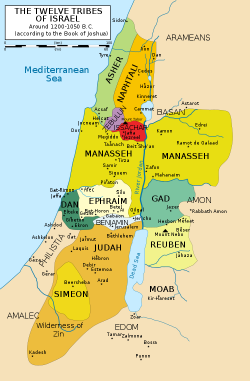
The author presents himself as an eyewitness to the accounts described, occasionally using first person pronouns (for instance, in Joshua 5:1). Joshua himself, however, is usually described in the third person. Some sections (e.g. 5:9, 7:26, 24:29-33), even according to Jewish tradition, could however only have been added after Joshua's death; tradition normally ascribes these sections to Eleazar or Phinehas. Also problematic is the frequently used phrase to this day, suggesting a substantial amount of time between the events and the account being written.
In Christian circles, both Catholic and Protestant, the authorship has been considered dubious since ancient times. The church father Theodoret proposed that it was written by a later author who had access to documents from Joshua's time.[5]
In early modern times, religiously conservative Jewish scholars continued to generally adhere to the traditional view, arguing that the book was written by a contemporary of Joshua, and their view was also adopted by Protestants. However, with the advent of source criticism, many scholars now reject claims of authorship by Joshua or his contemporaries. Most modern scholars argue that the Book of Joshua must be regarded as a compilation. An analysis of its contents leads to the proposition that Joshua's sources are of the same character as those of the Pentateuch. Indeed, many now use the term Hexateuch to refer to the traditional five "Books of Moses" plus the Book of Joshua.
In this theory, much of Joshua is a continuation of the "JE" source in the Torah, which itself is a combination of the southern Yahwist source (J) and the northern Elohist source, "E" (see documentary hypothesis). The Deuteronomist is considered to have detached the Joshua section of the hexateuch at some later point and embedded it within the Deuteronomic history, making a number of edits to frame the various narratives and insert his particular theology.
Relationship with the Book of Judges
Certain incidents mentioned by later biblical texts, particularly the Book of Judges, are often considered to drastically conflict with the situation presented by the Book of Joshua. For instance, Jericho, represented in Joshua as completely overthrown and concerning the rebuilding of which a solemn curse is invoked, is mentioned as existing at a later date, when it appears as a holy, rather than cursed, city.[6] Even more striking, where Joshua concludes with a nearly all-out victory, the narrative of Judges begins by portraying Canaan as hardly conquered, with the Israelite tribes showing little of the cohesion portrayed in Joshua. One theory suggests that the story of Joshua's seeming invincibility results from a later writer or editor during the time of King Josiah seeking to impress the king with the idea that he, too, would triumph militarily if he devoted himself to God as Joshua did. Josiah was considered as Israel's most righteous king by the biblical writers, yet he was slain in battle when he confronted Pharaoh Neccho II at the battle of Meggido.[7]
Historicity
Although early archaeological excavations seemed to support the historicity of Joshua, for example by finding destruction layers in a number of prominent sites such as Jericho, the conclusion that such destruction must have been due to Joshua has since been largely rejected. More recent reassessments and later excavations have reversed the earlier conclusions. Most archaeologists now believe that the destruction layers of various cities date from widely different times, and thus rather than a unified short military campaign, the remains are more suggestive of a series of isolated disasters/attacks over a period of centuries.
In the particular case of Jericho, it was already abandoned during the time of the Israelite conquest. Thus the supposed conquest of Jericho by the Israelites would have been the conquest and destruction of an empty ruin. The remains of Lachish and Hazor were both Canaanite cities in the Late Bronze Age. Between the thirteenth and twelfth centuries B.C.E., both cities were destroyed; they were later resettled by Israelites. Ai, on the other hand, appears to have been abandoned during the Early Bronze Age and was not reoccupied until well after the twelfth century B.C.E.. Even if one of these sets of cities was destroyed by an Israelite conquest, the other must have been destroyed at some point that was over a century later or earlier, contradicting the biblical account of a short period in which both sets were destroyed. In addition Ai is a particularly odd name for a town to have before its destruction, since it means ruin; meanwhile in the case of Hazor, a number of Egyptian inscriptions claim that it was destroyed by Seti I (circa 1300 B.C.E.) rather than the Israelites.
The time periods involved in the destruction layers of the cities overlap the campaigns of the Sea Peoples (who consistently burnt rich cities to the ground, even if they intended to later settle on the ruins), and the currently unexplained general late Bronze Age collapse of civilization in the whole eastern Mediterranean. It is far more plausible, from the point of view of an increasing majority of archaeologists, for these causes to have been responsible for the destruction of the cities, rather than an invasion of Israelites lasting only about 20 or so years.
In addition, since archaeological remains show a smooth cultural continuity in this period, rather than the destruction of one culture (Canaanite) and replacement by another (Israelite), a growing majority of archaeologists believe that the Israelites were simply an emergent subculture within Canaanite society—i.e. that an Israelite conquest would be a logical impossibility—it would have involved the Canaanites invading themselves, from Canaan.[7]
Genocide and biblical ethics
A major difficulty for modern readers of the Book of Joshua arises out of the command given by God to completely exterminate "anything that breathes" in the cities of Canaan (Deuteronomy 20:16-18).
Liberal theologians see this as an ethically unjustifiable order to commit genocide, which is inconsistent with the overall view in the Hebrew and Christian scriptures of God as the loving, compassionate parent of all mankind. In this view, the attitude of the Book of Joshua should be seen as originating in the intolerant views of the later Jerusalem priesthood rather than in the heart and mind of God.
Conservative theologians, on the other hand, see the book as an historically accurate account written during or soon after the life of Joshua. Thus, if the book says God told Joshua to do something, this must be taken as fact. They often give one of the following explanations to this problem:
- Canaanite society was horribly depraved including such practices as widespread child sacrifice and fertility rites that involved "sacred prostitution." In this view the destruction of the Canaanites was a positive good, and means that God ordered for its accomplishment cannot be questioned by mere humans.
- Christian theologians have tended to emphasize what they see as the progressive nature of revelation in the Bible. God is seen to reveal himself in ways that are fuller, clearer and more accurate, culminating in the ultimate revelation of God in Jesus Christ. God's command through Joshua to take possession of the land by force of arms is viewed in the context of God's command through the second Joshua, Jesus Christ, to bring about his kingdom through the peaceful application of his teaching.
Unification theologians also grapple with this question, usually affirming one of two views: 1) that God used different means in the Old Testament Age than he wants us to use today or 2) that because the Bible is not the literal word God, we should not necessarily accept the clearly genocidal actions of Joshua as being inspired by God.
Notes
- ↑ Gerizim would later become the central sanctuary of the Samaritans, who reject the southern sanctuary of Jerusalem as illegitimate.
- ↑ This account not only contradicts the view of modern archaeologists, who no evidence of a major, widespread, rapid conquest during this period, but also stands at odds with the Book of Judges, which makes it clear that many cities and towns were not conquered in Joshua's time.
- ↑ Othniel is later briefly mentioned as one of the judges.
- ↑ In fact several active altars a specifically mentioned as having been established by various patriarchs and prophets prior to this time. Modern scholars believe the idea of a centralized altar is a later concept inserted here by the Deuteronomic source (see documentary hypothesis.
- ↑ Theodoret of Cyrus, On Levitcus, Numbers, Deuteronomy, Joshua, Judges, and Ruth (The Catholic University of America Press, 2007, ISBN 978-0813215013).
- ↑ compare Joshua 6:2-27, 7:1, with Judges 3:12-30, 2 Samuel 10:5, 2 Kings 2:5, 15, and 1 Chronicles 19:5
- ↑ 7.0 7.1 Israel Finkelstein, The Bible Unearthed: Archeology's New Vision of Ancient Israel and the Origin of Its Sacred Texts (Free Press, 2002, ISBN 0684869128).
References
ISBN links support NWE through referral fees
- Bright, John. A History of Israel. Westminster John Knox Press; 4th edition, 2000. ISBN 0664220681
- Dever, William G. Who Were the Early Israelites and Where Did They Come From? William B. Eerdmans Publishing Co., 2003. ISBN 0802809758
- Finkelstein, Israel. The Bible Unearthed: Archeology's New Vision of Ancient Israel and the Origin of Its Sacred Texts. Free Press, 2002. ISBN 0684869128
- Grant, Michael. The History of Ancient Israel. Charles Scribner's Sons, 1984. ISBN 0684180812
- Keller, Werner. The Bible as History. Bantam, 1983. ISBN 0553279432
- Laymon, Charles M. The Interpreter’s One-Volume Commentary on the Bible. Abingdon Press, 1971. ASIN B000J53AMG
- Mazar, Amihai. The Archeology of the Land of the Bible. Anchor, 1992. ISBN 978-0385425902
- Miller, J. Maxwell. A History of Ancient Israel and Judah. Westminster John Knox Press, 1986. ISBN 066421262X
- Theodoret of Cyrus. On Levitcus, Numbers, Deuteronomy, Joshua, Judges, and Ruth. The Catholic University of America Press, 2007. ISBN 978-0813215013
External links
All links retrieved September 7, 2022.
- Translation with Rashi's commentary – at www.chabad.org.
- Book of Joshua – www.jewishencyclopedia.com.
|
|||||||||||||||||
Credits
New World Encyclopedia writers and editors rewrote and completed the Wikipedia article in accordance with New World Encyclopedia standards. This article abides by terms of the Creative Commons CC-by-sa 3.0 License (CC-by-sa), which may be used and disseminated with proper attribution. Credit is due under the terms of this license that can reference both the New World Encyclopedia contributors and the selfless volunteer contributors of the Wikimedia Foundation. To cite this article click here for a list of acceptable citing formats.The history of earlier contributions by wikipedians is accessible to researchers here:
The history of this article since it was imported to New World Encyclopedia:
Note: Some restrictions may apply to use of individual images which are separately licensed.
↧ Download as ZWI file | Last modified: 02/03/2023 22:54:39 | 154 views
☰ Source: https://www.newworldencyclopedia.org/entry/Book_of_Joshua | License: CC BY-SA 3.0
 ZWI signed:
ZWI signed: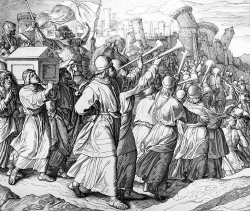
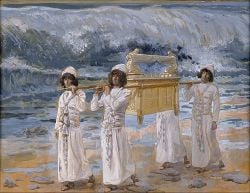
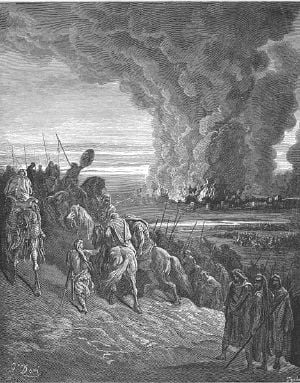

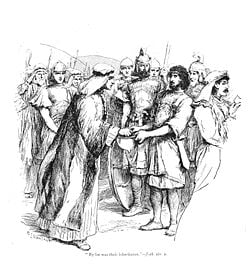
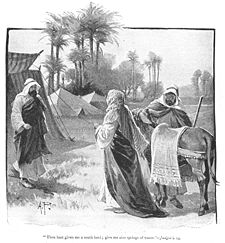
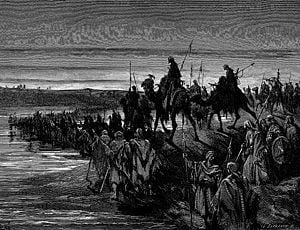
 KSF
KSF